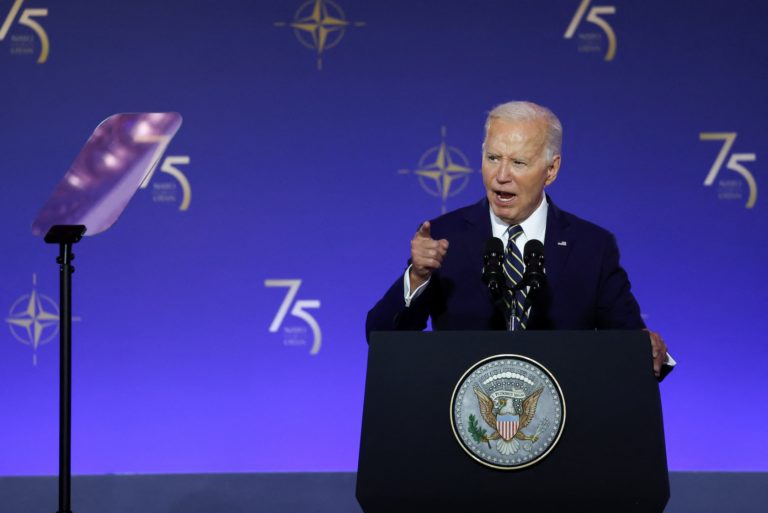World leaders have gathered at the NATO Summit in Washington to address pressing international challenges. At the top of the agenda is how to sustain Western support for Ukraine. Few leaders understand Ukrainian challenges and the NATO alliance as deeply as Czech President Petr Pavel who once served as chairman of NATO’s military committee. Geoff Bennett sat down with Pavel to discuss more.
Read the Full Transcript
Notice: Transcripts are machine and human generated and lightly edited for accuracy. They may contain errors.
-
Geoff Bennett:
It's the second day of the NATO summit in Washington, D.C., where leaders from around the world have gathered to address pressing international challenges. At the top of the agenda is how to sustain Western military support for Ukraine.
And perhaps few leaders understand Ukrainian challenges and the NATO alliance as deeply as Czech President Petr Pavel, a former Czech army chief he previously served as chairman of NATO's Military Committee and rose to the presidency earlier last year.
I spoke with him in Washington earlier today and began by asking him whether he thinks Ukraine can expel Russia from the Ukrainian territories it now occupies.
Petr Pavel, President of the Czech Republic: This should be not only Ukraine's, but our ultimate goal, that we all understand that the reality on the battlefield is different from our wishes.
It will be unrealistic to expect that Ukraine, with all our assistance, will be able to liberate all the occupied territories in a short time. We should strive for full sovereignty, for full control of internationally recognized borders, but it will most probably take time.
-
Geoff Bennett:
When you say it will most likely take time, how long should Ukraine expect to have Russia occupy some 20 percent of its country?
-
Petr Pavel:
I believe, first, we have to stop the war. And at this moment, Russia has no interest in stopping fighting, because they believe they can succeed on battlefield.
And once they realize that there is no chance of getting more ground, they will be only losing manpower and equipment, then the time comes for negotiation. We can provide Ukrainian support that will convince Russia that they cannot get any further success.
And that will move them to an understanding that the only way out of this conflict is at the negotiating table. And, of course, the result of that negotiation will depend on which position fighting countries will find themselves.
And our intent and our interest should be that Ukraine is in the best negotiating position as possible.
-
Geoff Bennett:
The U.S. and other countries have given Ukraine long-range missiles that allow them to fire on Russian forces in Crimea. Should the U.S. allow Ukraine to use those same weapons to fire deeply into Russia?
-
Petr Pavel:
Well, there was such an authorization that Ukrainians may target military targets in Russia, not deep, but along Ukrainian border.
I think it's natural because Russia concentrates its forces and ammunition, equipment just behind the border. And they should be allowed to make deep strikes to defend themselves effectively.
-
Geoff Bennett:
Part of the agenda at this week's NATO Summit is to advance Ukraine's membership into NATO.
Is it realistic to expect that Ukraine could become a member of NATO so long as it's involved in this conflict with Russia?
-
Petr Pavel:
It's hard to expect that Ukraine would become a full member in a short time before the war ends.
But all the allies stress that the integration of Ukraine into NATO is irreversible process. So it will continue through bilateral cooperations. It will continue through meeting NATO standards. It will continue through reforms on Ukrainian side.
But once this conflict is over, I believe that we should proceed as quickly as possible with full integration.
-
Geoff Bennett:
Is NATO supporting Ukraine enough, in your view?
-
Petr Pavel:
NATO is supporting Ukraine increasingly as a coordinating actor.
Ukraine cannot get full guarantee as a NATO member. It cannot be covered by Article 5. Those bilateral arrangements, and the number is growing day by day, give Ukraine a predictable picture of what they can rely on in the case of hostilities or another crisis.
It's a period that will reach this time from today to full membership. I think it is the maximum what we can do today, because raising expectations that Ukraine may become a member of NATO at this summit is obviously unrealistic.
-
Geoff Bennett:
The Czech Republic is surrounded by Hungary and Slovakia, which, as you well know, are both pro-Putin right now. What does that mean for you, for your leadership, and how do you fend off these populist trends?
-
Petr Pavel:
We are trying to be as open and as transparent as possible to our public, and not to let ourselves be distracted by their narratives that are quite often misleading.
It's not the case in Hungary and Slovakia. These countries are probably more attracted by Russian narratives, in expectation that some time in the future, they will restore good relations with Russia. It should be in our interest to have good relations with Russia, on the condition that Russia respects international norms and order based on rules.
Until then, it's hard to have any meaningful relationship with Russia because it doesn't keep promises.
-
Geoff Bennett:
How closely are you following the U.S. election?
-
Petr Pavel:
Well, with great interest, of course.
The democratic world is always looking for a leader, someone to look at in times of crisis and difficulties. And the United States are naturally leading the democratic world, because it's the most powerful country of this family. It doesn't mean that we should be all dependent on the United States.
I think it's about a true partnership. Europe should be able to provide much more in terms of its own defense and capabilities.
-
Geoff Bennett:
Why hasn't it been able to?
-
Petr Pavel:
Because it was comfortable, yes.
After the Cold War, when everyone believed we are now facing times of cooperation and building prosperity, European countries had a tendency to spend less on defense. Unlike U.S., you see a number of challenges around the world which were not so close to Europe.
Decades ago, the share was roughly 50/50 between European allies and the United States. Over time, it turned to 75 percent for the United States and only 25 for Europe. It's not fair. And we should come back to the reasonable share of our responsibility.
-
Geoff Bennett:
In your view, what would Donald Trump winning back the White House in November mean for the future of the NATO alliance and the security of individual NATO countries?
-
Petr Pavel:
Well, I believe, with the experience that we had from his term from 2016 to 2020, he had a number of strong expressions.
But, in reality, he pushed the alliance in the right direction.
-
Geoff Bennett:
In what ways?
-
Petr Pavel:
We may criticize the way, how he presented the arguments, but the arguments themselves were fair, because what he wanted was the fair share of our responsibility.
A number of countries are now meeting the commitment to spend at least 2 percent of GDP on defense. A number of countries are heavily investing into modernization. So, I think his message came through.
If Donald Trump gets elected again, I don't think it will mean any disaster for Europe or Ukraine, because the United States are aware that they need Europe, the same way as Europe needs the United States.
-
Geoff Bennett:
Is that a view that is shared among other NATO countries?
-
Petr Pavel:
I believe so, because a number of countries understand the rationale behind these calls on NATO European allies, because we were truly spending much less than was necessary.
And we all realize that, with Russia being the most urgent and imminent threat to European security, we need, effectively, to do more. So even without any strong calls from the United States, we are doing that in our self-interest.
-
Geoff Bennett:
Petr Pavel, president of the Czech Republic, thank you so much for your time. We appreciate it.
-
Petr Pavel:
Thank you.








